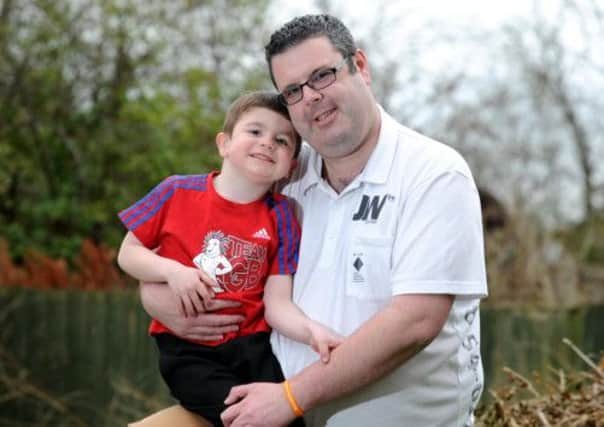MPs urged to speed-up NHS drugs access to save children


A parliamentary inquiry is examining the future of access to high-cost drugs for rare diseases and funding for research, amid massive changes in the NHS.
Families affected yesterday warned unless swift action was taken to make vital new drugs available, they would come too late for those who need them.
Advertisement
Hide AdAdvertisement
Hide AdAround 100 children with Duchenne muscular dystrophy, usually boys, are born in the UK each year. At present, they can expect to be in a wheelchair by the time they are just 10 and most won’t live to see their 30th birthday.
But new drugs, currently at the clinical trial stage, could prolong young patients’ lives and also enable them to walk for far longer.
Mark Creswick from Sheffield, whose five-year-old son Harley has the condition, was one of those who put their case before the All Party Parliamentary Group (APPG) for Muscular Dystrophy at Westminster.
“We want to ensure that, once it’s proven these drugs work, we don’t have to wait a long time for them,” he said. “On average, it can take five to 10 years for new drugs to become available, but we haven’t got that long.”
Advertisement
Hide AdAdvertisement
Hide AdAccording to the Muscular Dystrophy Campaign, there are just 23 expert care advisors supporting the 60,000 people in England who have a muscular dystrophy or a related condition. As a result, many families are forced to travel long distances for specialist care.
A parliamentary inquiry in 2008-9 exposed wide gaps in care and poor support. It also highlighted deep concerns over early deaths for boys with Duchenne muscular dystrophy in the Yorkshire and the Humber NHS area which at a mean of 17.2 years is nearly half that of the North East.
Robert Meadowcroft, chief executive of the Muscular Dystrophy Campaign, said the research was a “race against time”.
“We must work hard to reduce unnecessary delays in the NHS administering a therapy should it become available,” he added.
Advertisement
Hide AdAdvertisement
Hide Ad“Families living with conditions like Duchenne muscular dystrophy simply cannot afford to wait. Every day is vital for boys like Harley.”
The families told the APPG they want MPs to ensure that, if these drugs are proved to work, they are funded by the NHS and available quickly. Mr Creswick, 36, said: “At the moment, the only treatment is steroids, that can prolong a child’s ability to walk before ending up in a wheelchair.”
Harley, from High Green in Sheffield, was just a toddler when his parents first noticed something was wrong – but it took another 18 months to get a diagnosis.
“He’d just come out of nappies and he was struggling to climb stairs,” Mr Creswick said. “He’d crawl up, instead of trying to stand. We also noticed he wasn’t able to get up from the floor without holding onto things, and he couldn’t jump.
Advertisement
Hide AdAdvertisement
Hide Ad“The first time we went to the doctor he just told us to come back in a few months’ time. It was only through our own persistence they started referring us.
“We were referred to a physiotherapist and then to the Children’s Hospital in Sheffield for blood tests, when we eventually we got the diagnosis.”
Mr Creswick said he and his wife, Dawn, had been given “some encouragement” by taking their case to the Government.
“A diagnosis of Duchenne muscular dystrophy completely changes your life,” he added. “When you have children, you have plans for them, for what you’d like to see them do in the future. But this changes everything.”
Advertisement
Hide AdAdvertisement
Hide AdThe APPG group is chaired by MP Dave Anderson, who lost both his brother and his sister to Duchenne muscular dystrophy. It launched the inquiry in February and will present a report by September this year.
Khurm Arshad of Bristol, whose brother Auzair, 15, has Duchenne muscular dystrophy, said: “We can’t do anything to change the pace of medical progress – but we can plan ahead to make sure not a moment is wasted if a therapy is shown to work.”
Comment: Page 12.